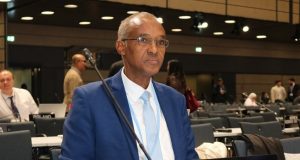As the world gears up for the UN climate talks in Baku, Azerbaijan, in November 2024, African climate finance practitioners recently met to deliberate on various expectations for the new climate finance goal in the lead up to the African Group of Negotiators meeting holding in Nairobi, Kenya, from August 14 to 16.

The consultation affirmed that Africa must chart a new course of action in shaping the future of climate finance. The new finance goal offers an opportunity for Africa to strengthen her agency and strategically centre the goal’s determination around real and felt needs, realities and demands.
The experts emphasised the need for developed countries to commit at least $ 5.9 trillion by 2030 based on the growing needs and priorities of developing countries to finance adaptation, mitigation, the just transition, and loss and damage. These funds should majorly come from public coffers of developed, wealthy nations and should avoid debt instruments that exacerbate the debt burden of developing countries.
The experts also urged developed countries not to derail climate talks this year with discussions on the contributor base but should instead stay within the confines of the UN Climate Convention and the Paris Agreement which places responsibility to provide and lead mobilisation of finance to support climate action on these countries.
Iskander Erzini Vernoit, IMAL Initiative for Climate & Development, said: “If the new climate finance goal is set based on the limited politics of today, the world will fail to rise to the climate challenge. It cannot be an incremental increase from the 100 billion, but rather must commit well over a trillion in annual international public finance in order to respond to what the science and studies are calling for.”
Samson Mbewe, South South North, said: “To truly address the climate crisis, the NCQG must steer clear of debt instruments, especially those that masquerade as climate finance and yet are market-related loans. Developing countries are in dire need of grants, especially for their adaptation efforts. Loans of any sort would need a higher degree of concessionality. With many developing countries already burdened by significant debt, adding more through ‘climate finance’ could deepen financial struggles rather than help.
“It is essential that we find ways to support climate action without increasing debt. We also need to remember that developed nations have a responsibility to help those who have been most affected by climate change. The NCQG should focus on fair and sustainable solutions that genuinely support global efforts without creating additional financial strain.”
Julius Mbatia, Climate Finance Expert, said: “The post 2025 finance goal must constitute a quantum that is commensurate with the needs of developing countries to fairly transition, support adaptation, tackle loss and damage, and set on a low carbon climate resilient path. The quantum must not be short of what climate needs demand, currently not less than $5.9 trillion by 2030, as it will NOT signal urgency and ambition. Africa’s ask for a $6.5 trillion until 2030 affirms the necessity of a needs-based finance goal. A quantum that does not constitute public finance at scale in grants for adaptation, and loss and damage, shall not resonate with climate realities of developing and vulnerable countries. A quantum that insists on market rate loans shall do more harm to already highly indebted vulnerable nations in regions such as Africa.”
Eva Peace Gatwa, Loss and Damage Youth Collaboration, said: “If we set a climate finance goal without agreeing to a common definition of climate finance, we will be setting ourselves up for failure. There will always be mistrust when it comes to climate finance provided, and a high risk for humanitarian aid, ODA finance, and other finance to be reported as climate finance. Climate finance definition equals transparency and accountability.”
Julius Ng’oma, CISONECC, Malawi, said: “Financial resources mobilised and provided for under the operating entities of the UNFCCC financial mechanisms have proved to be difficult to access due to challenging formats of procedures, requirements, and timelines and therefore should be improved. Success in the delivery of an ambitious and effective climate goal will be measured by simplification of access modalities to climate finance to developing countries under the UNFCCC mechanism.”
Adrian Chikowore, Institute for Economic Justice, said: “The new climate finance goal should be set based on sustainable financing options that do not keep developing countries in vicious cycles of debt. As such, private sector-led finance should not be the core or central to climate finance as it often overlooks the needs of those most affected by climate change, offering piecemeal solutions that fail to address systemic inequalities.”
